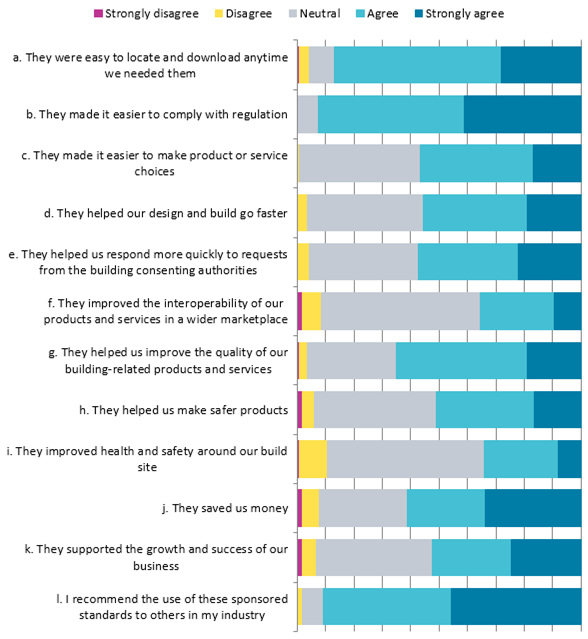What are our customers telling us?
In June, Standards New Zealand conducted a survey to gather feedback on how users access, store and use sponsored (pre-funded) building and construction standards.
The results said
The most common reason for accessing sponsored building standards is to show that new building design and construction work undertaken is, or will be, building code compliant.
The survey results indicate that sponsored standards have a positive impact on users and the industry by removing cost barriers to accessing standards, meaning that more users are willing to access the standard and find it easier to comply with regulation. Since the building regulator commenced sponsoring (pre-funding access to) building and construction standards they cite in regulations and the building code, the uptake and use of these standards has increased 20-fold.
Respondents also advised that:
- the relevant building standards are easy to locate on Standards NZ website, making it easier to comply with regulations and achieve building code compliance
- they recommend the use of sponsored standards to others within their industry, which assists with promoting good practice and compliance outcomes
- they would rarely, or not at all, access a building and construction standard if it was not sponsored (free to access)
- they are interested in digital formats and more sophisticated product features for sponsored standards. This was especially true of the architectural and engineering fraternity, whose work today is digital (for example, using Computer Aided Design [CAD] and Building Information Management [BIM] software)
- other benefits of using sponsored standards included achieving improved quality of building products and services, faster response times to building consent authorities’ information needs, and cost savings for design and construction activities.
Figure 1 – Survey findings on using sponsored building standards
Based upon your experience using sponsored building standards, please tell us how much you agree or disagree with each of the following statement:

a. They were easy to locate and download anytime we needed them
- Strongly disagree 0.8%
- Disagree 3%
- Neutral 9%
- Agree 59%
- Strongly agree 28%
- Total 121
b. They made it easier to comply with regulation
- Strongly disagree 0%
- Disagree 0%
- Neutral 7%
- Agree 51%
- Strongly agree 41%
- Total 122
c. They made it easier to make product or service choices
- Strongly disagree 0%
- Disagree 0.8%
- Neutral 42%
- Agree 40%
- Strongly agree 17%
- Total 118
d. They helped our design and build go faster
- Strongly disagree 0%
- Disagree 3%
- Neutral 41%
- Agree 37%
- Strongly agree 19%
- Total 117
e. They helped us respond more quickly to requests from the building consenting authorities
- Strongly disagree 0%
- Disagree 4%
- Neutral 38%
- Agree 35%
- Strongly agree 22%
- Total 117
f. They improved the interoperability of our products and services in a wider marketplace
- Strongly disagree 2%
- Disagree 7%
- Neutral 56%
- Agree 26%
- Strongly agree 9%
- Total 116
g. They helped us improve the quality of our building-related products and services
- Strongly disagree 0.8%
- Disagree 2%
- Neutral 32%
- Agree 46%
- Strongly agree 19%
- Total 117
h. They helped us make safer products
- Strongly disagree 2%
- Disagree 4%
- Neutral 43%
- Agree 34%
- Strongly agree 16%
- Total 116
i. They improved health and safety around our build site
- Strongly disagree 0.9%
- Disagree 10%
- Neutral 55%
- Agree 26%
- Strongly agree 8%
- Total 114
j. They saved us money
- Strongly disagree 2%
- Disagree 6%
- Neutral 31%
- Agree 27%
- Strongly agree 34%
- Total 116
k. They supported the growth and success of our business
- Strongly disagree 2%
- Disagree 5%
- Neutral 40%
- Agree 28%
- Strongly agree 24%
- Total 118
l. I recommend the use of these sponsored standards to others in my industry
- Strongly disagree 0%
- Disagree 2%
- Neutral 7%
- Agree 45%
- Strongly agree 46%
- Total 120
Standardisation underpins trusted robust construction contracts
New Zealand benefits by having robust and clear contracts behind construction projects
With contracts underpinning the detail of multi-billion-dollar construction, engineering and infrastructure projects, standardisation plays a crucial role in ensuring clarity in establishing well understood contractual arrangements. NZS 3910 Conditions of contract for building and civil engineering construction has proven to be one of our most hotly anticipated standard reviews under way (its first revision in 10 years) and is due for publication in late 2023.
The Construction Sector Accord (through the Ministry of Business, Innovation and Employment Hīkina Whakatutuki) and the New Zealand Infrastructure Commission, Te Waihanga, jointly commissioned Standards New Zealand to lead the revision.

